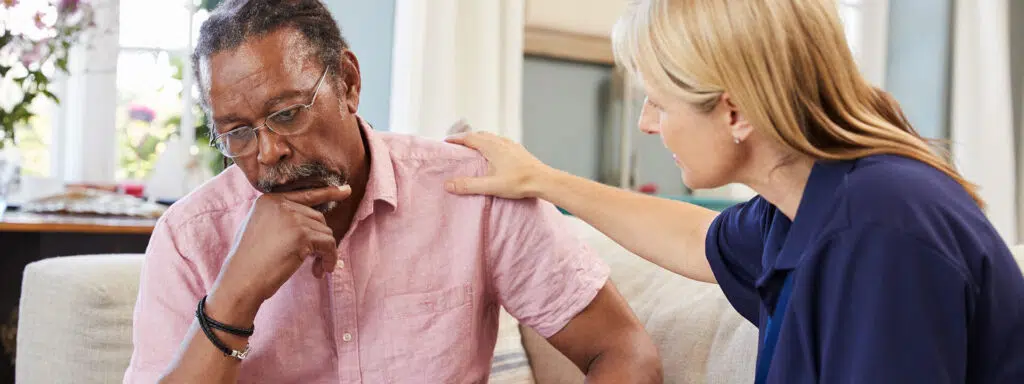Read the latest and greatest from our team
of incredible specialists.

Beach House Recovery Center » Blog » Understanding Your Dual Diagnosis
When both addiction and mental illness are present simultaneously, professionals in the treatment field call it a dual diagnosis or a co-occurring disorder. Untreated mental illness often compounds the dangers of addiction, and vice versa. Sadly, people struggling with mental disorders such as depression, anxiety and PTSD can also be more susceptible to developing a substance misuse problem.
If a doctor or therapist has told you that you have a dual diagnosis, what should you know, and what are your options for getting healthy?

If you have a dual diagnosis, you aren’t alone. According to the National Survey on Drug Use and Health, 9.2 million U.S. adults experienced both mental illness and a substance use disorder in 2018.
An addiction often evolves because people living with emotional turmoil can turn to substance use in an attempt to self-medicate and mute the feelings they’re experiencing. However, they could be unknowingly making their mental illness symptoms worse.
Some drugs also make it more likely that their users will develop a mental illness. Because many drugs have dangerous and unpredictable side effects, it’s possible for someone to experience mental health problems such as psychosis after drug use, even if the drug has never been problematic for them before.
Because co-occurring conditions affect everyone differently, the signs of a dual diagnosis vary among people. However, there are a few broad symptoms to be aware of.
Though there are several approaches for treating a dual diagnosis, the best one is the integrated method, in which you will get help for substance abuse and mental illness simultaneously. Because co-occurring conditions are so complex, a customized treatment plan that takes into account how each condition affects the other is essential.
Evidence-based therapies form the backbone of a successful dual diagnosis treatment plan. In particular, cognitive behavioral therapy and motivational interviewing help people with co-occurring disorders learn new ways of thinking and healthy coping mechanisms that do not include addictive substances.
If you are considering seeking help for your dual diagnosis, you should be aware that there’s no such thing as an overnight cure. Indeed, treating a co-occurring condition often takes longer and requires a lot of patience. Dual-diagnosis treatment is designed to address both addiction and mental health issues simultaneously, and while the process may take time, it offers a comprehensive approach for long-term recovery. Because addiction is a chronic disease, part of your treatment plan will require you to learn how to manage it for the rest of your life. However, there is hope. At Beach House, we have helped many people with co-occurring disorders go on to live happy and fulfilling lives.
Your treatment plan will usually begin with inpatient detoxification, during which our team will monitor your withdrawal symptoms 24/7 in a safe, comfortable environment. After completing medical detox, your next step will be to move into our inpatient rehab facility, where you can receive ‘round-the-clock clinical supervision. In this phase, you will learn new life skills and will begin to participate in treatments that help identify and address the underlying causes of your problems. This stage lasts, at minimum, 35 days. However, there is a correlation between longer treatment times and successful recovery.
Before leaving inpatient rehab, you will need to decide on an aftercare plan that accounts for what you are going to do next. Some people find it is best to continue seeking treatment on an outpatient basis, while others transition into sober living communities that provide a stepping stone between the structure of treatment and the stresses of the “real world.” Regular participation in peer groups such as Alcoholics Anonymous is helpful as well.
Are you ready to reclaim your life from the difficulties of a dual diagnosis? Beach House is here to help you meet your goals. Contact us anytime to get started.
Whether you’re researching for yourself or a loved one, Beach House can help. We understand that this is a serious time in your life and that the treatment center you choose matters. We want you to feel comfortable and empowered to make the right decision for yourself, a friend, or a family member. This is why a counselor is waiting and available to answer your questions and help put your mind at ease regarding the next steps. Many of the staff at Beach House have walked in your shoes. If you feel you’re ready or want more information about how to help a loved one, we can help today. You can also learn why we are voted the #1 rehab for addiction treatment in Florida.
We accept most major insurance plans and can verify your benefits quickly and confidentially.
We’re committed to helping you access the care you need, our admissions counselors can guide you through your coverage options and available resources.





"*" indicates required fields